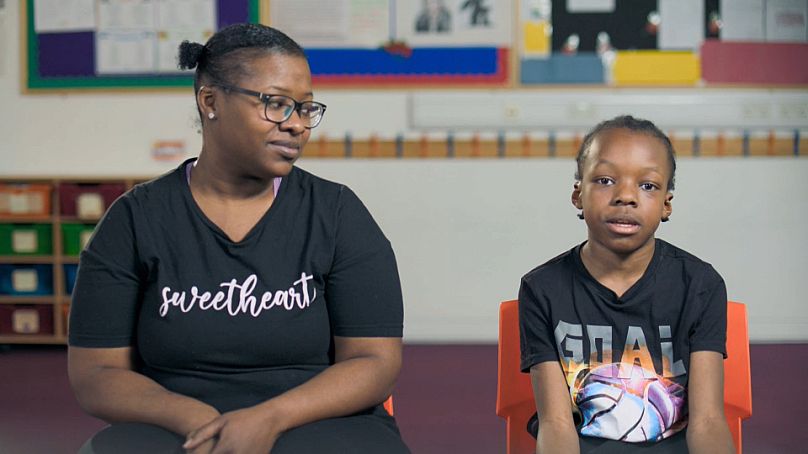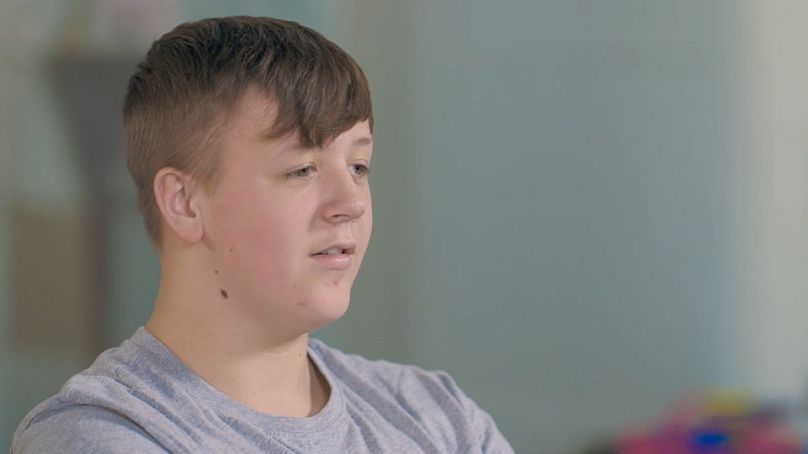Children are more online than ever before. As kids immerse themselves in the world of video games, Hacker Hunter explores how they’ve become increasingly vulnerable to hackers.
Children are more online than ever before. But as kids immerse themselves in the world of video games, they’ve become increasingly vulnerable to hackers.
 ADVERTISEMENT
ADVERTISEMENT
 ADVERTISEMENT
ADVERTISEMENT
By 2025, the video game market is set to reach a value of $256.97 billion.
One in three people around the world play video games, and a significant portion of the gamers are children.
Digital and real currencies in games
One of the most popular games with children is Roblox, an online platform that allows users to create their own games for others to play.
Millie, 11, likes playing Bloxburg, a house building simulator, while Tavion, 10, is a fan of Pet Simulator.
In both games, completing tasks gets you the in-game currency which you can use to buy items. But you can also buy the currency with real money. Roblox has its own currency called Robux.
“One of the more recent developments in games has focused on in-game purchases,” says Dr Kelli Dunlap, a clinical psychologist and game designer. “Yes, you bought the game, but now if you want more, you have to pay a little extra.”
The lure of in-game purchases is particularly appealing to children who might not have an adult understanding of money.
Jovan, 10, is one of those kids. Aware his mum wouldn’t let him make the purchases, he was wily enough to ask his grandma instead.
“Unbeknown to me, grandma and Jovan have a little system,” Jovan’s mum Vicky says, explaining how he might ask her to give him some money for a new game token.
“We have to keep grandma in check sometimes,” Vicky says.
Online treasure troves for hackers
As children spend more time and more money on their games, they amass collections of digital items that have great emotional value to them.
It’s these digital collections that hackers are targeting.
One day, when Tavion logged into Roblox, he found all his most treasured pets missing. His griffin had been stolen.
Jovan had a similar experience playing Rocket League, a driving/football game. A car he’d customised with special decals and wheels had lost all of the customisations he’d worked hard to add.
The hackers went one step further with Millie, whose entire Roblox account was taken from her.
“The money that we’d put into it with Roblox and all the pets on that account and everything was gone,” she says. “I felt devastated to see it all gone and I think I was crying.”
Digital items, real emotions
Losing the game items they’ve worked hard for can be a difficult emotional experience for children, explains Dunlap.
The effort the children have put into completing tasks for those items gives them value.
“Even though the item is digital, that sadness is genuine and it makes total sense when you think about the thought and care that kids are putting into their digital creations,” Dunlap says.
“On the day that I was hacked, I felt very sad and I didn’t understand why, what was happening when I got hacked,” Tavion says.
Callum, 14, had a collection of digital outfits on Roblox that he was really proud of. One outfit, dragon-styled armour was worth 1,000 Robux, equal to between $3.50 and $12.50.
After his collection was stolen by a hacker, he found it exhausting to start from scratch earning it all back.
“You’re going to have to play a lot, obviously. And when you play a lot in a game you get burnout,” Callum says.
Dunlap notes that children referring to burnout aren’t being hyperbolic. Despite games being for fun, children can be exhausted when recovering from a hack.
Why would someone hack a kid's game?
Mike Jones is a security researcher who’s worked with the hacker collective Anonymous. He now focuses on working with children who have got into trouble with online games.
“Most of the time kids have their parents’ credit card or debit card attached to the account,” Jones says.
“What they don’t understand is there are people in that game that look for those purchases and they make money off that and they trade those accounts and they sell those accounts or they sell items within that account,” he explains.
Hackers can translate the digital currency children have into monetary funds in their bank accounts.
With real money on the line, organised crime groups have got involved with hacking these games.
“Kids are often more susceptible to these kinds of social engineering attacks. They have almost no experience on how people would take advantage of them,” says Christian Funk, head of the German Research and Analysis Team at Kaspersky.
“While it might be very traumatic to lose an in-game item you worked so hard for. At the same time, it actually teaches you a very important lesson in life,” Funk adds.
Callum has changed his passwords following his hacking. And Tavion has started storing his digital possessions across multiple accounts.
But Jones also thinks the industry itself has a lot to answer for by allowing children to come in harm’s way.
“The gaming companies and the gaming industry need to take more responsibility when it comes to the effects it has on kids,” he says.





















